小学英语:形容词与副词的比较级与最高级
英语形容词和副词的比较级和最高级
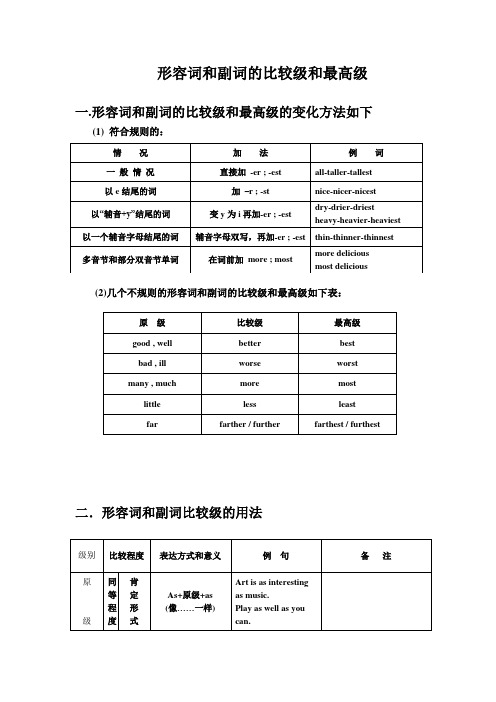
形容词和副词的比较级和最高级一.形容词和副词的比较级和最高级的变化方法如下(1) 符合规则的:(2)几个不规则的形容词和副词的比较级和最高级如下表:二.形容词和副词比较级的用法注意:有些形容词,如 dead, empty, round, sure, woolen 等受本身含义的限制,没有比较级。
例题解析1. He is ________ friends than I.A. much moreB. many moreC. very moreD. too more解析:后面有可数名词复数时,many的比较级形式为many more 修饰。
应选B.2. Which is the _________ country, Japan or Australia?A. more developedB. more developingC. most developedD. most developing解析:两者比较用比较级,表示"发达"用developed, 而developing 是"发展中的" 意思3. There were _______ shops in the city in 1982 than in 1990.A. littleB. fewC. fewerD. less解析:little 不能修饰可数名词,两者比较需用比较级,所以应选C.4. If you are not free today, come another day __________.A. tooB. soC. insteadD. yet解析:instead 作副词用时意为"代替,顶替",表示前面的事情没做,而是做了后面的事。
Instead一般位于句首。
应选C.5.He can't tell us ________, I think.A. important anythingB. anything importantC. important somethingD. something important.解析:不定代词与形容词联用需后置,否定句中应该用anything而不是something. 因此应选B6. The Huang River is the second __________ river in our country.A. longB. longerC. longestD. the longest解析:"定冠词the+ 序数词+ 形容词最高级" 表示"第几大……" 应选C.7. The light in the office wasn't ________for him to read.A. enough brightB. bright enoughC. brightlyD. enough brightly解析:enough修饰名词时可前可后,修饰形容词或副词时,要后置。
英语中形容词副词的比较级和最高级
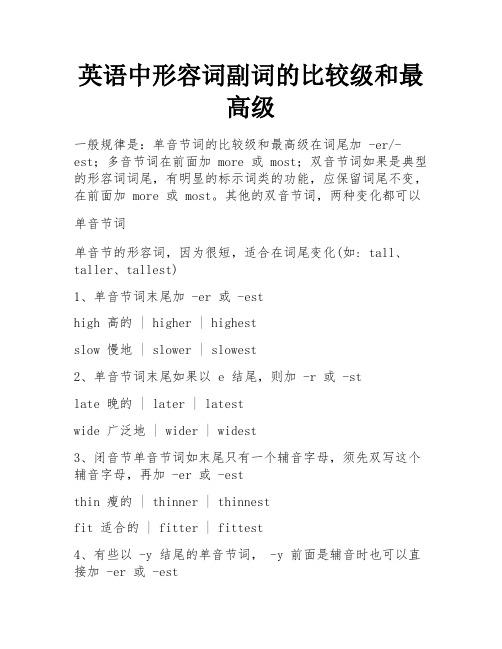
英语中形容词副词的比较级和最高级一般规律是:单音节词的比较级和最高级在词尾加 -er/-est;多音节词在前面加 more 或 most;双音节词如果是典型的形容词词尾,有明显的标示词类的功能,应保留词尾不变,在前面加 more 或 most。
其他的双音节词,两种变化都可以单音节词单音节的形容词,因为很短,适合在词尾变化(如: tall、taller、tallest)1、单音节词末尾加 -er 或 -esthigh 高的 | higher | highestslow 慢地 | slower | slowest2、单音节词末尾如果以 e 结尾,则加 -r 或 -stlate 晚的 | later | latestwide 广泛地 | wider | widest3、闭音节单音节词如末尾只有一个辅音字母,须先双写这个辅音字母,再加 -er 或 -estthin 瘦的 | thinner | thinnestfit 适合的 | fitter | fittest4、有些以 -y 结尾的单音节词, -y 前面是辅音时也可以直接加 -er 或 -estshy 害羞的 | shyer | shyestsly 狡猾的 | slyer | slyestwry 讽刺的 | wryer | wryest多音节词三个音节以上的多音节词已经很长,不适合再加词尾变化,因而在前面加 more 或 most,表示更(最)...,或者加 less 或least ,表示更(最)不...interesting 有趣的 | more interesting | most interestingimportant 重要的 | less important | least importantcarefully 认真地 | more carefully | most carefully双音节词双音节形容词很尴尬:不长不短,怎么判断?1、词尾是典型的形容词词尾,有明显的标示词类的功能,应保留词尾不变,在前面加 more 或 mostcrowded more crowded most crowdedloving more loving most lovinghelpful more helpful most helpfulfamous more famous most famousactive more active most active2、其他的双音节形容词,如果不是典型的形容词字尾,变化则无限制,两种变化都可以often oftener(more often) oftenest(most often)shallow shallower(more shallow) shallowest(most shallow)3、如果是 -y 结尾,这个长母音因为发音上的要求,要先变成短母音的 i,再加字尾变化,如:happy happier happiestlucky luckier luckiest二、不规则形式good/well | better | bestbad/ill/badly | worse | worstmany/much | more | mostlittle | less | leastfar | farther/further | farthest/furthestold | older/elder | oldest/eldest三、比较等级英语中形容词副词有三个比较等级,即原级、比较级和最高级1、原级(1) 表示程度相同,即“和...一样...”时用原级,常用"as... as" 结构It is as beautiful as paradise in Heaven. 这里如天堂般美丽This room is as broad as it is long. 那个房间长宽相等He is as handsome as John (is). 他和约翰一样英俊He studies as hard as John (does). 他和约翰一样努力(2) as...as... 引导的结构可采用倒装句型He studies as hard as John (does). = He studies as hard as does John.He is as handsome as John is. = He is as handsome as is John.(3) 否定的原级用 not as...as 或not so...as,二者区别不大You are not as tall as he. 你没有他高Guangzhou is not as clean as Shanghai. 广州没有上海那么干净I didn't do so well as I should. 我做得不如我应做得那么好(4) as/so... as... 结构前可以用 just、quite、almost、nearly、half 等词在程度上加以修饰This story was quite as interesting as we had thought. 这个故事和我们想的一样精彩The bike is not half so new as mine. 这辆自行车还没我的一半新She can read twice as fast as he does. 她的阅读速度比他快一倍John is not quite as good a student as his sister.连接词 as 表示这是组 as..as 的比较级。
形容词和副词的比较级和最高级
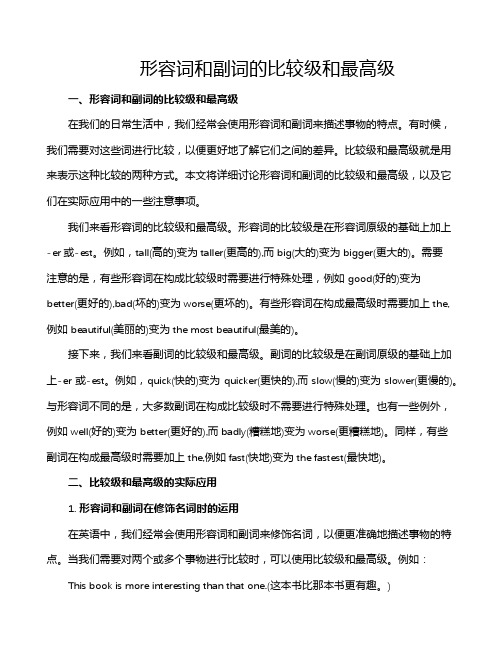
形容词和副词的比较级和最高级一、形容词和副词的比较级和最高级在我们的日常生活中,我们经常会使用形容词和副词来描述事物的特点。
有时候,我们需要对这些词进行比较,以便更好地了解它们之间的差异。
比较级和最高级就是用来表示这种比较的两种方式。
本文将详细讨论形容词和副词的比较级和最高级,以及它们在实际应用中的一些注意事项。
我们来看形容词的比较级和最高级。
形容词的比较级是在形容词原级的基础上加上-er或-est。
例如,tall(高的)变为taller(更高的),而big(大的)变为bigger(更大的)。
需要注意的是,有些形容词在构成比较级时需要进行特殊处理,例如good(好的)变为better(更好的),bad(坏的)变为worse(更坏的)。
有些形容词在构成最高级时需要加上the,例如beautiful(美丽的)变为the most beautiful(最美的)。
接下来,我们来看副词的比较级和最高级。
副词的比较级是在副词原级的基础上加上-er或-est。
例如,quick(快的)变为quicker(更快的),而slow(慢的)变为slower(更慢的)。
与形容词不同的是,大多数副词在构成比较级时不需要进行特殊处理。
也有一些例外,例如well(好的)变为better(更好的),而badly(糟糕地)变为worse(更糟糕地)。
同样,有些副词在构成最高级时需要加上the,例如fast(快地)变为the fastest(最快地)。
二、比较级和最高级的实际应用1. 形容词和副词在修饰名词时的运用在英语中,我们经常会使用形容词和副词来修饰名词,以便更准确地描述事物的特点。
当我们需要对两个或多个事物进行比较时,可以使用比较级和最高级。
例如:This book is more interesting than that one.(这本书比那本书更有趣。
)She sings the best in the choir.(她在合唱团里唱得最好。
形容词与副词的比较级与最高级形式
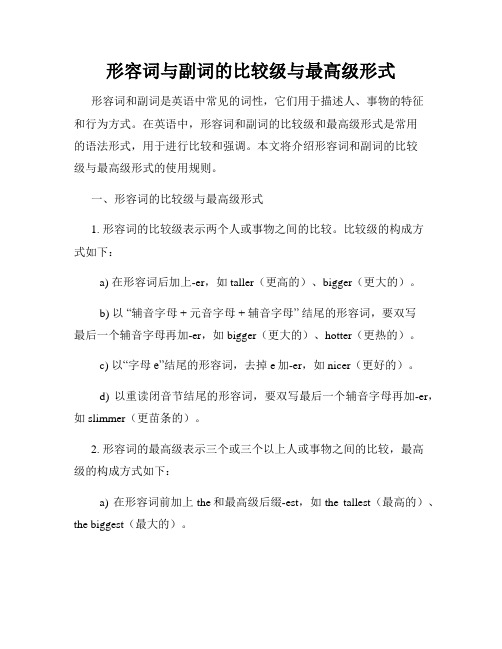
形容词与副词的比较级与最高级形式形容词和副词是英语中常见的词性,它们用于描述人、事物的特征和行为方式。
在英语中,形容词和副词的比较级和最高级形式是常用的语法形式,用于进行比较和强调。
本文将介绍形容词和副词的比较级与最高级形式的使用规则。
一、形容词的比较级与最高级形式1. 形容词的比较级表示两个人或事物之间的比较。
比较级的构成方式如下:a) 在形容词后加上-er,如taller(更高的)、bigger(更大的)。
b) 以“辅音字母 + 元音字母 + 辅音字母” 结尾的形容词,要双写最后一个辅音字母再加-er,如bigger(更大的)、hotter(更热的)。
c) 以“字母e”结尾的形容词,去掉e加-er,如nicer(更好的)。
d) 以重读闭音节结尾的形容词,要双写最后一个辅音字母再加-er,如slimmer(更苗条的)。
2. 形容词的最高级表示三个或三个以上人或事物之间的比较,最高级的构成方式如下:a) 在形容词前加上the和最高级后缀-est,如the tallest(最高的)、the biggest(最大的)。
b) 形容词以“辅音字母 + 元音字母 + 辅音字母” 结尾,要双写最后一个辅音字母再加-est,如the biggest(最大的)、the hottest(最热的)。
c) 形容词以“字母e”结尾,去掉e加-est,如the nicest(最好的)。
d) 以重读闭音节结尾的形容词,要双写最后一个辅音字母再加-est,如the slimmest(最苗条的)。
二、副词的比较级与最高级形式1. 副词的比较级与形容词的比较级形式相同,可以通过在副词后加上-er构成,如faster(更快地)、longer(更长地)。
2. 副词的最高级可以通过在副词前加上the和最高级后缀-est构成,如the fastest(最快地)、the longest(最长地)。
3. 以-y结尾的副词,把y变为i再加-er和-est,如happily(快乐地)的比较级为happier(更快乐地),最高级为the happiest(最快乐地)。
形容词和副词的比较级和最高级(完美版)
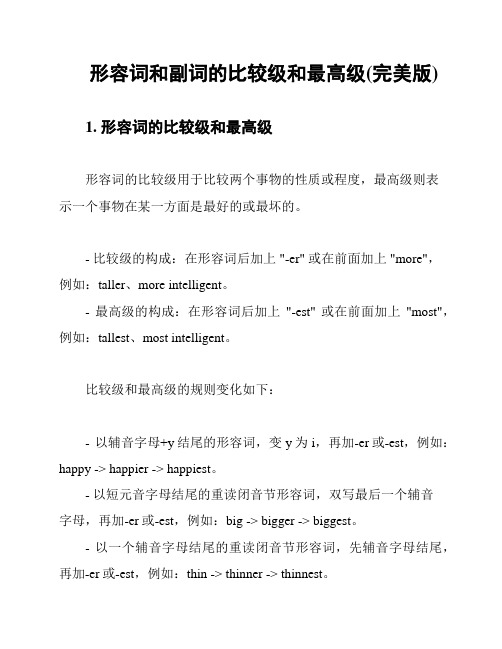
形容词和副词的比较级和最高级(完美版)1. 形容词的比较级和最高级形容词的比较级用于比较两个事物的性质或程度,最高级则表示一个事物在某一方面是最好的或最坏的。
- 比较级的构成:在形容词后加上 "-er" 或在前面加上 "more",例如:taller、more intelligent。
- 最高级的构成:在形容词后加上"-est" 或在前面加上"most",例如:tallest、most intelligent。
比较级和最高级的规则变化如下:- 以辅音字母+y结尾的形容词,变y为i,再加-er或-est,例如:happy -> happier -> happiest。
- 以短元音字母结尾的重读闭音节形容词,双写最后一个辅音字母,再加-er或-est,例如:big -> bigger -> biggest。
- 以一个辅音字母结尾的重读闭音节形容词,先辅音字母结尾,再加-er或-est,例如:thin -> thinner -> thinnest。
- 多音节和部分双音节形容词前加more或most,例如:beautiful -> more beautiful -> most beautiful。
2. 副词的比较级和最高级副词的比较级和最高级的构成方式与形容词类似,只是在形容词的基础上加上 "-ly" 构成副词。
- 比较级的构成:在副词后加上 "-er" 或在前面加上 "more",例如:faster、more quickly。
- 最高级的构成:在副词后加上 "-est" 或在前面加上 "most",例如:fastest、most quickly。
与形容词类似,副词的规则变化也遵循相同的规律。
四形容词和副词的比较级最高级

四、形容词和副词的比较级、最高级(Comparison of Adjectives and Adverbs)I. 形容词比较级和最高级的形式一、形容词比较级和最高级的构成⑥合成形容词的比较等级•大多数在前面加more及most。
例如:home-sick, more home-sick, most home-sickup-to-date, more up-to-date, most up-to-date•若第一个词是大家熟悉的单音节词,则-er及-est都加在这个词的前面。
例:Long-lasting, longer-lasting, longest-lastinghard-working, harder-working, hardest-workingKind-hearted, kinder-hearted, kindest-heartedWell-known, better-known, best-known二、不规则形容词的比较级和最高级形式II.副词比较级和最高级的形式副词比较级和最高级的变化形式与形容词基本上一样。
一、一般副词hard→harder →hardest fast→faster →fastestlate→later →latest early→earlier →earliest二、特殊副词well →better →best much →more →mostbadly →worse →worst little →less →least三、开放类副词开放类副词即以后缀-ly结尾的副词不能像形容词那样加-er或-est,而应在副词原形前加more或most。
如:quickly →more quickly →most quickly quietly →more quietly →most qui etlyIII.形容词与副词比较级和最高级的基本用法一、比较级1.比较级通常由“形容词(副词)比较级+than+…”构成,表示在两者中间一方比另一方“更加……”。
英语中形容词和副词的比较级和最高级的规则是什么?

英语中形容词和副词的比较级和最高级的规则是什么?一、一般规则1.单音节词和少数双音节词:一般在词尾加-er 构成比较级,加-est 构成最高级。
例如:●tall(高的)→ taller(更高的)→ tallest(最高的);●short(短的)→ shorter(更短的)→ shortest(最短的);●fast(快的)→ faster(更快的)→ fastest(最快的)。
2.以字母 e 结尾的词:直接加-r 构成比较级,加-st 构成最高级。
例如:●nice(好的)→ nicer(更好的)→ nicest(最好的);●large(大的)→ larger(更大的)→ largest(最大的)。
3.以“辅音字母 + y”结尾的词:先把 y 改为 i,再加-er 构成比较级,加-est 构成最高级。
例如:●happy(快乐的)→ happier(更快乐的)→ happiest(最快乐的);●busy(忙碌的)→ busier(更忙碌的)→ busiest(最忙碌的)。
4.重读闭音节词(即:辅音+元音+辅音):双写末尾的辅音字母,再加-er 构成比较级,加-est 构成最高级。
例如:●big(大的)→ bigger(更大的)→ biggest(最大的);●hot(热的)→ hotter(更热的)→ hottest(最热的)。
二、多音节词和部分双音节词在前面加 more 构成比较级,加 most 构成最高级。
例如:●beautiful(美丽的)→ more beautiful(更美丽的)→ mostbeautiful(最美丽的);●important(重要的)→ more important(更重要的)→ mostimportant(最重要的)。
三、不规则变化有些形容词和副词的比较级和最高级是不规则的,需要单独记忆。
例如:●good/well(好)→ better(更好)→ best(最好);●bad/badly/ill(坏)→ worse(更坏)→ worst(最坏);●many/much(多)→ more(更多)→ most(最多);●little(少)→ less(更少)→ least(最少);●far(远)→ farther/further(更远)→ farthest/furthest(最远)。
形容词和副词地比较级和最高级(完美版)

形容词、副词的比较级和最高级一.形容词和副词的比较级和最高级的变化方法如下(1) 符合规则的:情况加法例词一般情况直接加-er ; -est all-taller-tallest以e 结尾的词加–r ; -st nice-nicer-nicest以“辅音+y”结尾的词变y为i再加-er ; -est dry-drier-driestheavy-heavier-heaviest以一个辅音字母结尾的词辅音字母双写,再加-er ;-estthin-thinner-thinnest多音节和部分双音节单词在词前加more ; most more delicious most delicious(2)几个不规则的形容词和副词的比较级和最高级如下表:原级比较级最高级good , well better bestbad , ill worse worst many , much more most little less leastfar farther / further farthest / furthest 二.形容词和副词比较级的用法级别比较程度表达方式和意义例句(备注)原同肯定As+原级+as(像⋯⋯一样)Art is as interesting as music.Play as well as you can.等级程度否定not + so (as) +原级+asE nglish is not so difficult as science.She does not study so well as I do.(不如⋯⋯那样)Jim is older比较不同程度(用于两者比较)比较级+than(比⋯⋯)t han Luky.I like porkbetter thanbeef.比较级前面可以加much, far, even, still,a lot, a little, a bit 等比较级+and+比较级He is growing taller and taller. 级(越来越⋯⋯)He studies better and better.程度加深The + 比较级,the + The more books she reads, the better比较级she understand.(越⋯⋯, 越⋯⋯)1最高级最高程度(用于三者或三者以上)The +最高级+of (in)(最⋯⋯)Spring is the best season ofthe year.Lin Tao jumped (the)farthest of all.副词最高级前面的the 往往省略三.形容词副词比较级最高级的其他用法( 1)和冠词连用the +形容词原级+v(复),指一类人或物the +形容词比较级,指两者中“较⋯的”的那一个,eg. the younger of thea/ an +形容词比较级eg. The pen is expensive. I want a cheaper one.( a) +most+形容词最高级“非常⋯”eg. a most beautiful city( 2 ) 相关结构a. 原级比较:肯定句as⋯.as ⋯.,否定句not so / as⋯.as ⋯..b.比较句:比较级+than ⋯或.more (less) ⋯.than ⋯..The furniture in this shop is less beautiful than that in that shop.c.比较级+and+比较级或more and more+比较级“越来越⋯”richer and richer, more and more interestingd. The more ⋯.., the more 越⋯⋯.. ,“越⋯”The more you look at the picture, the better you will like it.e. 比较级+than any other +n. (单)(适用于范围一致时)(all) other +n.(复)any +n.(单) (适用于范围不一致时)He is taller than any other student / all other students in his class.any student in my class.f. 倍数表达法。
- 1、下载文档前请自行甄别文档内容的完整性,平台不提供额外的编辑、内容补充、找答案等附加服务。
- 2、"仅部分预览"的文档,不可在线预览部分如存在完整性等问题,可反馈申请退款(可完整预览的文档不适用该条件!)。
- 3、如文档侵犯您的权益,请联系客服反馈,我们会尽快为您处理(人工客服工作时间:9:00-18:30)。
A. I and he B. he and you C. he and I D. I and you
( ) 1 I saw___ playing in the street at that time.
A. them B. they C. their D. theirs
( ) 2 Tom and ____ will go to see our teacher, for ___ is ill.
A. I; she. B. me; she C. I; her D. me; her
( ) 3 Is___a boy or girl?
A. she B. he C. one D. it
3 Sorry I have forgot ____ telephone number.
A. yours B. him C. you D. his
( ) I The bear was shot in___ head. ? A. the B. its C. a D. this
( ) 2 The old man took the girl by ____ hand and they went down the street.
XXXX教育学科教师辅导讲义
讲义编号
学员编号:年级:小六课时数:
学员姓名:辅导科目:英语学科教师:
学科组长签名及日期
学员家长签名及日期
课题
形容词与副词的比较级与最高级
授课时间:
备课时间:
教学目标
掌握代词、特殊疑问句、形容词与副词的比较级与最高级的用法
重点、难点
形容词与副词的比较级与最高级
考点及考试要求
A. It's me B. That's I C. This is a boy D. It's I
( ) 3 -Look, who is coming?
-___ must be our English teacher.
A. She B. He C. It D. This
( ) 4 Someone is knocking at the door, but who can____ be?
形容词与副词的比较级与最高级
教学内容
Step One:check homework
StepTwo:代词、特殊疑问句和代词的练习
( ) 1 Though it rained heavily, ____ were still playing on the playground.
A. they B. them C. their D. themselves
A. you, he and I B. you, him and me C. I, you and he D. me, you and him
( ) 1 Who's that at the door? B. This C. It D. He
( ) 2 -Who's that in the picture?
A. her B. a C. the D. that
( ) 3 He apologized to me for hitting me___ face.
A. on the B. at the C. in the D. in my
( ) T Our room is big, but____ is bigger than____.
( ) 4 The pen is hers. Pass it to____, please.
A. her B. she C. hers D. herself
( ) 5 Let me go and give the coat to____.
A. he B. his C. himself D. him
( ) 6 They asked___ to do the work.
A. There B. It C. This D. The place
( ) 1 The bird built___ nest in the tree.
A. it's B. her's C. hers D. its
( ) 2 Have you seen___pen, a black one?
A. these B. my C. you D. hers
( ) 3 ___ a heavy rain last night.
A. There had B. We had C. It was D. There is
( ) 4 ___ is 200 kilometres from here to the natural park. We have to go there by car.
A. you B. your C. yours D. her
( ) 4 You have a good room, I should say. But it's not as big as___.
A. I B. my C. me D. mine
A. their; our B. their; ours C. theirs; ours D. theirs; our
( ) 2 They aren't our books. Are they____?
A. your B. his C. her D. their
( ) 3 Our room is bigger than ___.
A. one B. he C. she D. it
()1 ___ was late summer and the weather was very hot.
A. That B. It C. This D. It's
( ) 2 What time is ____ now?
A it B. all C. this D: that
2 Jim will give____ a short talk tomorrow.
A. we B. us C. our D. ours
( ) 3 Please ask____ not to skate on the thin ice.
A. they B. them C. their D. theirs
